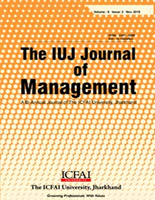( Anil Kumar Mishra & Rabinarayan Patnaik )
Keywords : Cluster, cropping intensity, land, irrigated area, NCA




 The IUJ Journal of Management (IUJ-JOM) is the flagship journal of ICFAI University Jharkhand, Ranchi. The aim of the journal is to provide insight into the business and management research. It also creates a platform for the researchers, academicians, professors , practicing management professionals and proponents in disseminating original, theoretical and applied research in the field of management and allied disciplines.
The IUJ Journal of Management (IUJ-JOM) is the flagship journal of ICFAI University Jharkhand, Ranchi. The aim of the journal is to provide insight into the business and management research. It also creates a platform for the researchers, academicians, professors , practicing management professionals and proponents in disseminating original, theoretical and applied research in the field of management and allied disciplines.
The Journal is a Bi-Annual (November and May), double blind reviewed journal, . . . . .Read more.
 Teaching Aptitude can be defined as a condition or set of characteristics possessed by an individual, indicative of the ability to grasp not only the subject matter but also the aims and processes of education (Dave N. and Raval D., 2015). It predicts a person's ability to explain difficult points and clarify obscurities.
Teaching Aptitude can be defined as a condition or set of characteristics possessed by an individual, indicative of the ability to grasp not only the subject matter but also the aims and processes of education (Dave N. and Raval D., 2015). It predicts a person's ability to explain difficult points and clarify obscurities.
Right aptitude is the source to create competitive advantage for the organization and higher educational institutes, . . . . . .Read more.
 It is a saying that, “Everything Else Can Wait but Not Agriculture.”
It is a saying that, “Everything Else Can Wait but Not Agriculture.”
LPG (Liberalisation, Privatisation, and Globalisation) is the new buzzword
that has come to the world since the dawn of the nineties of the last century.
Liberalisation as a part of this worldwide phenomenon (LPG) has become a major
component in the reform process of the Indian economy in the year of 1991, July 24
with the introduction of New Reform Policy.
. . . . .Read more.
 Organizations communicate to their stakeholder through various
channels of communication. The mass media communication may be
termed as advertising or publicity. The direct communication is
termed as direct marketing. The advances in communication technology
have created Social Media, capable of communicating with large groups
of stakeholder as well have personalized messages.
Organizations communicate to their stakeholder through various
channels of communication. The mass media communication may be
termed as advertising or publicity. The direct communication is
termed as direct marketing. The advances in communication technology
have created Social Media, capable of communicating with large groups
of stakeholder as well have personalized messages.
The selection of the media is critical to ensuring the message
conveys to the to the appropriate target audience at an appropriate time.
. . . . . . .
Read more.
Subscribe now to get notified about IU Jharkhand journal updates!
( Anil Kumar Mishra & Rabinarayan Patnaik )
Keywords : Cluster, cropping intensity, land, irrigated area, NCA
( S.K.Padhi & Madhumita Dey )
Keywords : Trade liberalisation, Agricultural export and import, 1991 Reform
( Nagapavan Chintalapati & Venkata Srinivas Kumar Daruri )
Keywords : Social Media; Business Schools; User Generated Content (UGC)
( Seema R Laddha )
Keywords : Internet, Rural, demographics, social media, expected use
( K. Satyalakshmi & Pallavi Kumari )
Keywords : Entrepreneurial intentions, Theory of planned behavior, Shapiro Entrepreneurial event, research design, conceptual framework
( Vishal Kumar & B.M. Singh )
Keywords : Foreign Direct Investment, Foreign institutional investor, Portfolio, Endowments,
( Khushbu Agarwal & Rumna Bhattacharyya )
Keywords : Organizational Change, Employee Resistance, Failure of Change program
( Rajeev Kumar )
Keywords : Film industry, motion pictures, Piracy, Ticket Price, Online and experience
( Mamta Brahmbhatt )
Keywords : Online Brand Communities, Brand Loyalty
( Ranjan Dasgupta )
Keywords : Job work performance, Psycap, training management, performance appraisal.
( Prabhat Kumar Pani & Rajesh Kumar )
Keywords : Ethos, Ethics, Philosophy, Miniaturization, Self-introspection, Meditation
